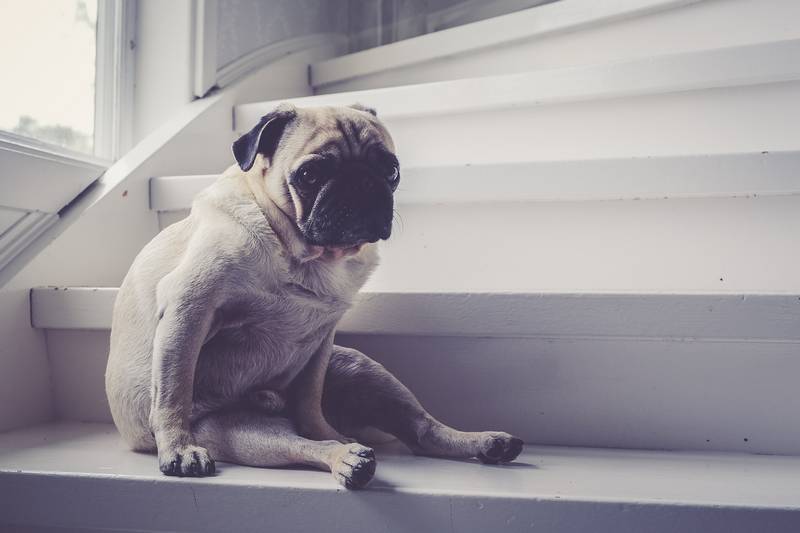“My Dog Barks When I Go Upstairs!”: How to Stop [10 Easy Steps!]
Does your dog bark when you go upstairs and you can’t figure out why? In this article, we’re going to help you by going over the reasons behind this behavior and also guiding you through a 10-step fix to stop your dog from barking when you go upstairs.
We’ll explore the reasons why your dog may bark or whine at the gate when you head up the stairs. We’re also going to cover how to stop your dog from going upstairs if you’d just like them to stay away from that part of your home completely.
Dealing with a dog crying when you go upstairs also will certainly tug at your heartstrings, so we’ll help you take care of that too. Keep reading for all this information and more below!
How to Stop My Dog Barking When I Go Upstairs

To stop your dog barking when you go upstairs:
- To get your dog to be silent whenever they start to bark when you go upstairs, teach them the “quiet” command.
- Practice by taking your dog to a place where they’re likely to bark when you go upstairs, with lots of treats for reinforcement.
- When your dog begins barking, say “quiet” in a positive and calm voice. If they listen and become silent while also paying attention to you, immediately give them a treat and praise.
- But if your dog keeps barking or quickly starts back up, then hide a treat in the palm of your hand. Place your hand right next to your dog’s nose. They’ll still be able to smell it even inside of your fist and should stop barking to sniff it.
- Once they’ve stopped barking and are paying attention to you, again say “quiet,” and then open your hand to reward them with a small treat and praise. If they keep being silent and are paying you their full focus, keep rewarding them with praise and treats.
- But if they again start to bark or are not paying attention, repeat the steps of placing a treat within your fist, placing it near their nose, and waiting until they stop their barking and pay attention.
- Make sure to always pause until they’ve stopped their barking and are paying you all their attention, and then say “quiet” before you give them any praise or treats. This forms a positive connection for your dog with the “quiet” command, and with being silent and giving you their complete attention.
- With consistency, practice, and patience, you will be able to get them to respond only with the “quiet” command, and you’ll no longer need to place your hand by their mouth.
- When your dog is responding well with just the command, then you should start increasing the amount of time you pause before you give them any rewards. Begin by pausing for 2 seconds, then as they do well increase that to 5 seconds, and so on.
- It won’t be long until it will no longer be necessary to give your dog any praise and food, and they will become quiet and pay attention to you just by you giving the command.
These steps will get your dog to stop barking when you go upstairs, but it’s important to remember that the underlying behavioral issues (separation anxiety, dominance, attention-seeking, etc.) that were causing all of this to begin with will still be present. And until you address those, any positive changes you see are only going to be temporary.
“Well, how do I make this change stick?”
By getting your dog to truly choose to follow your direction, that’s how. I tried many times to write out how you can do that before deciding it made more sense to just link you to the free video series that explains it better than I’d ever be able to.
The series is by a man named Dan who is one of the world’s leading dog obedience trainers. In it, he teaches you how to put an end to things like when your dog barks when you go upstairs and all other misbehavior using his fast and easy-to-follow methods.
In the first video, Dan will reveal to you why the two most common methods of dog training only doom you to failure. You can watch the video now by clicking here. Follow the proven system he’ll show you in his series and you’ll never have to spend another second worrying about your dog barking when you go upstairs ever again!
Why Does My Dog Bark When I Go Upstairs?

Your dog barks when you go upstairs likely due to reasons such as separation anxiety, curiosity, or wanting to alert you of a perceived danger. They may also be trying to communicate with you or draw your attention.
It’s important to understand these potential triggers as it can greatly aid in addressing your dog’s behavior in a more effective manner, thus ensuring their comfort and your peace of mind.
Separation Anxiety
One of the most common reasons dogs bark when you go upstairs is due to separation anxiety. Dogs, being social animals, can form an extremely close bond with their owners. They find comfort and security in your presence, sometimes to the extent that your dog won’t leave you alone at all.
So, when they can’t see you or be near you, they may start to feel anxious or stressed. This anxiety can lead to various signs of distress, one of which is barking. They may bark continuously or intermittently as a way of expressing their distress and their desire for you to return to their side.
Curiosity or Attention Seeking
Another reason why dogs bark when their owners go upstairs is out of curiosity or to seek attention. Dogs are naturally curious creatures, and they want to be involved in everything their owners do. Your dog might be barking because they’re intrigued about what you’re doing upstairs without them.
They might feel left out and the barking is a way to express their desire to be included in whatever you’re doing. It can also be a way to attract your attention, especially if they’re used to getting your attention when they bark.
Alerting of Perceived Danger
Dogs have keen senses, and they are very protective of their owners. They could be barking when you go upstairs because they perceive a danger that you may not. For instance, they might hear a strange noise upstairs that you can’t, or they might smell something unusual. Their barking is their way of alerting you to the potential danger. It’s their instinct to protect you, and they use their bark to communicate this concern.
Training to Reduce Barking
Once you understand the reason why your dog is barking when you go upstairs, it becomes easier to address this behavior. In the first section of this article, we’ll teach you how to train your dog to be quiet on command, while also giving you the tools to address the root issue which is actually causing everything.
Understanding your dog’s reasons for barking can help you address the issue in a way that’s most beneficial for both of you. Remember, patience and consistency are key when dealing with any type of dog behavior.
Dog Barking & Whining at Gate When I Go Upstairs
When your dog barks and whines at the gate when you go upstairs, it may be because of separation anxiety, wanting to join you, or not understanding why they can’t follow. There are several methods you can use to help your dog feel more comfortable when you go upstairs, such as training, using toys, or making their space more comfortable.
Let’s take a deeper look at why this might be happening and what you can do about it.
- Separation Anxiety: Dogs can suffer from separation anxiety when their owners leave their sight. If your dog is barking and whining when you go upstairs, it may be because they are feeling anxious about being alone. This could manifest in other ways too, such as destructive behavior, barking when you leave the apartment, or having accidents in the house when you’re not around. Training, consistency, and patience are key to helping your dog overcome this anxiety. Learn more about addressing this problem in the first section of this article.
- Wanting to Join You: Sometimes, your dog might just want to be where you are! Dogs are social creatures and often want to be included in everything their family does. If they’re used to being with you all the time, they might not understand why they can’t join you upstairs. Training your dog to understand that it’s okay for family members to be in different parts of the house can help with this. You can do this by creating positive associations with their own space, like giving them treats or toys when they’re in their area, so they’re content even when you’re not there.
- Lack of Understanding: If your dog doesn’t understand why they can’t follow you upstairs, they might express their confusion through barking and whining. It might not be clear to them why they’re being left behind. Training your dog to understand boundaries can help them realize that they can’t always go where you go. Consistent and clear instructions, like using a specific word or gesture every time you go upstairs, can signal to your dog that it’s not their time to follow you.
Helping your dog feel comfortable when you’re not in sight takes time and patience. With consistent training and by making their space comfortable and enjoyable, you can help ease their distress when you go upstairs. Remember, every dog is different and what works for one might not work for another. It’s all about finding what suits your dog best.
How to Stop Dog Going Upstairs
To stop your dog from going upstairs, you can use training techniques such as setting clear boundaries, using baby gates, rewarding good behavior, and creating a comfortable space downstairs for them. Here are some more details on these methods and how to apply them:
- Setting Clear Boundaries: Train your dog to understand that upstairs is off-limits. You can use verbal commands like “No” or “Stay” whenever they attempt to go upstairs. Consistency is key here; ensure everyone in your household is on the same page and enforces these rules regularly.
- Using Baby Gates: Baby gates can physically prevent your dog from going upstairs. Choose a sturdy gate that your dog cannot easily jump over or knock down. While this may not teach your dog that the upstairs is off-limits to the point that you can go without a gate, it will at least prevent them from being there without your supervision.
- Rewarding Good Behavior: Reward your dog for respecting boundaries. Whenever they obey your command not to go upstairs, give them a treat or a lot of praise. This will reinforce the positive behavior, and they’ll be more likely to repeat it in the future.
- Creating a Comfortable Space Downstairs: Make sure your dog has a comfortable and enjoyable space downstairs. This could include their favorite toys, a comfy bed, and plenty of attention from family members. If they love being downstairs, they’ll have less of a reason to want to go upstairs.
By being consistent, rewarding good behavior, and providing a comfortable alternative, you can train your dog to stop going upstairs. It may take some time and patience, but with dedication, your dog will understand the new rules and boundaries. Learn more about teaching your dog to be obedient in the first section of this article.
Dog Cries When I Go Upstairs
Your dog cries when you go upstairs likely due to separation anxiety, a desire for companionship, or a perceived danger. This behavior may also be an attempt to communicate needs or feelings to you. Understanding your dog’s specific triggers and the underlying reasons for their emotional response can help you address this behavior effectively, improving their comfort and your bond with them.
Separation Anxiety
One of the most common reasons why dogs cry when their owners go upstairs is separation anxiety. Dogs are pack animals by nature, and they can form a strong attachment to their human family. When you go upstairs and leave them alone, they may feel anxious or distressed. This distress can manifest itself in various ways, one of which is crying. If your dog is crying continuously or seems particularly distressed when you’re out of sight, they may be dealing with separation anxiety.
Desire for Companionship
Dogs are social creatures and they often enjoy being in the same space as their owners. If your dog cries when you go upstairs, it could be simply because they want to be with you. This desire for companionship can sometimes lead to behaviors like whining or crying when you leave the room. Your dog may feel left out and the crying is their way of expressing their desire for your company. It’s a clear indication of their affection towards you but it can become problematic if it leads to over-dependence.
Perceived Danger
Dogs have a highly developed sense of hearing and smell, and they’re often more aware of their surroundings than humans are. If your dog cries when you go upstairs, it might be because they sense something that you don’t. They could have heard a strange noise or they might smell something unusual. Their crying is their way of alerting you to the potential danger.
Training and Solutions
Understanding why your dog cries when you go upstairs is the first step in addressing this behavior. Training methods such as desensitization and counter-conditioning can be helpful in reducing your dog’s anxiety and crying behavior. Learn to identify and treat the cause of your dog’s issue in the first section of this article.
I’m sure you’re ready for you dog to stop going crazy when you go upstairs, so I’ll let you get started now. Good luck with everything, and thank you for reading our article “My Dog Barks When I Go Upstairs!”





